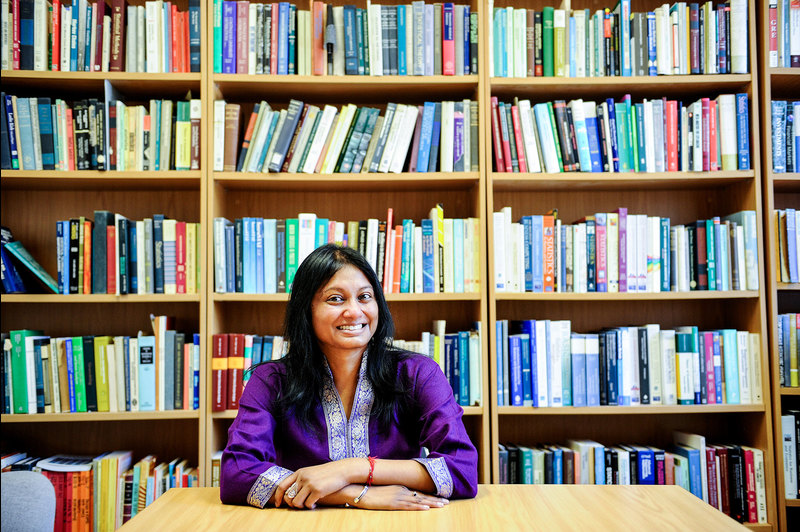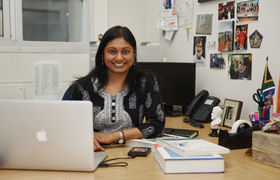UCT to build capacity for malaria modelling in Africa
17 October 2022 | Story Nadia Krige. Photo Lerato Maduna. Read time 4 min.
The University of Cape Town (UCT) has received a major funding boost from the Bill & Melinda Gates Foundation to launch a three-year capacity-building programme for malaria modelling in sub-Saharan Africa.
The Malaria Modelling and Analytics: Leaders in Africa (MMALA) programme has received a grant of US$3 million over three years from the Gates Foundation to develop a critical mass of African malaria modellers to meet the need for tailored quantitative malaria decision support in a sustainable way.
The programme is headed by Associate Professor Sheetal Silal, the director of the Modelling and Simulation Hub, Africa (MASHA) based in UCT’s Department of Statistical Sciences. Associate Professor Silal’s research focuses on using mathematics and statistics to model the transmission and control of malaria, COVID-19 and other diseases in South Africa, sub-Saharan Africa and globally.
MMALA is one of five projects that have received funding from the Gates Foundation to boost malaria modelling capacity in Africa. The funding opportunity forms part of the foundation’s Grand Challenges Global Call-to-Action initiative and seeks to support the World Health Organization’s (WHO) goal of eliminating malaria by 2030.
Creating opportunities for postgraduates
“We’re very excited to be producing a cohort of 12 PhD students and three postdoctoral researchers,” said Silal. “We’ve sent a call for applications throughout the region, targeting the Elimination 8 (E8) countries of Angola, Botswana, Eswatini, Mozambique, Namibia, South Africa, Zambia and Zimbabwe, as well as Ghana, Cameroon and Benin.
“Our previous research has shown that a regional approach is necessary to eliminate malaria,” she said. “Each country working in isolation is not cost-effective, but a regional approach will bring mutual benefits and savings. And that is also the strength of this particular project.”
MMALA has already received 85 applications for the PhD positions and the interview process is already under way.
Silal emphasised the fact that the programme aims to produce malaria modellers who not only understand the science of malaria elimination, but are also able to translate this science into implementable policy and advise governments on the best way to achieve their health goals. The idea is to take a holistic approach to training by providing a proactive and reactive training programme that runs the gamut of malaria knowledge and offers students opportunities to revisit areas they struggle with.
“We take a systemic approach to training, exploring the epidemiological, economic, social, demographic and other aspects in the world of malaria; not just modelling infection, but the system in which malaria transmits,” she explained.
“We plan to engage the diverse community of malaria scientists – including policy makers, health economists, climate scientists and so on – to come together and contribute to a training programme for the students in the first eight months of the programme, before they start their research projects.”
Apart from the PhD training programme, MMALA will also be training a group of postdoctoral and early-career researchers who are employed at universities across Africa.
“This grant is also a way for us to help our rising stars on the continent, [by] providing research opportunities and leadership training,” said Silal.
Building capacity beyond campus
While the first year of the programme will be largely student focused, Silal said that the focus of the second year will be to increase the capacity for using malaria modelling in government.
“During this phase, we’ll be introducing policy makers to the benefits of modelling and how to critically engage with it,” she said. “It will be important to work together to build a pipeline of decision-making from science to policy.”
To realise this capacity-building goal, MMALA will also be working closely with advocacy organisations such as SADC E8 and NGOs like the Clinton Health Access Initiative (CHAI).
“So, between our training of students, engaging with governments and partnering with the likes of E8 and CHAI, we’re able to create a triangulated programme, which will hopefully lead to impactful and implementable research over the next three years, bringing us one step closer to a malaria-free region.”
 This work is licensed under a Creative Commons Attribution-NoDerivatives 4.0 International License.
This work is licensed under a Creative Commons Attribution-NoDerivatives 4.0 International License.
Please view the republishing articles page for more information.










